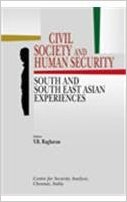Civil societies are increasingly playing a significant role in the politics of the developing world. It is known in different countries by different names—non-governmental organizations, citizen sector, independent sector, initiative sector, social economy sector and voluntary sector. It occupies the space between family and the state and is involved in attaining different, but inter-related, goals in political, economic, social, educational and environmental fields. In an ideal situation, it should enjoy complete autonomy from the state. In developing societies, characterized by wide social and economic disparities, many of these organizations are engaged in attaining social justice, social equality and, in a wider sense, promotion of human security. The book under review, the outcome of an international seminar organized by the Centre for Security Analysis in Chennai in August 2007, attempts to bring together civil society and human security issues together.
The book seeks to analyse how these organizations actually function and what the future prospects and challenges for them are. At a theoretical plane, the state and civil society organizations have the same goal—furtherance and promotion of human security. How they work together to attain these goals or does the state put obstacles in the working of the civil society organizations naturally should be of interest to the general public. What is the role of ASEAN and SAARC in the attainment of these objectives? How are the civil societies coping with ethnic, religious and separatist struggles that pose a challenge to nation building? The book is divided into five parts: An overview of the linkages between civil society and security; social security issues; conflict situations; human rights and social justice and issues relating to governance. The contributions, perhaps inevitable in an edited volume, are of uneven quality.
Two preliminary observations are in order. In countries of South Asia, the non-governmental organizations are playing an important role in not only sensitizing the social and economic problems, but they also play a significant role in moulding public opinion. Organizations like the Chipko movement, Narmada Andolan and human rights organizations in Nepal immediately come to mind. In Southeast Asia the authoritarian governments of varying shades do not take a tolerant view of dissenting voices. In fact, it was fashionable for the political elite in Malaysia and Singapore to speak about ‘Asian values’ (which according to them imply respect for authority) to justify the existing political order. But after the overthrow of the Suharto regime in Indonesia and the ascendancy of democratic culture, the slogan of Asian values has receded to the background. Equally relevant, ASEAN has not been able to play a benign role on issues relating to human rights and democratic values. When Myanmar was admitted into ASEAN the policy of ‘constructive engagement’ which ASEAN pursued was intended to persuade the military regime to introduce democratic reforms in the political system. But the unfortunate result was to provide political legitimacy to military rule.

